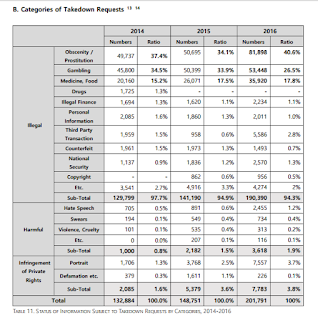This year's Korea Internet Transparency Report is out. As usual, the whole thing's a fascinating read. Here are some parts I found interesting. All images screenshot from their report.
No surprise that obscenity and prostitution make up the largest portion of takedown requests. Nearly 4% for portrait right violations is interesting. I wonder how many of those were due to photo studios or advertisers using models against their knowledge. Interesting that only 1% was due to leaked personal information. With all the netizen vigilantes out there [here and here just out this week], I partly suspected the number to be a bit higher.
Here's what you clicked for. Prostitution ads, despite how much attention these illegal online prostitution services get in the media, don't make up that big a chunk of the obscenity takedowns. Sex acts take it. "Others" likely include fan fic and erotic novels.
Despite the image of a bunch of repressed bureaucrats trolling the internet all day looking for porn to block and monitoring your every click, it turns out the clear majority of content is reported. Who's lodging the complaints? Maybe the casual viewer who finds something offensive, or maybe these guys. I didn't see a clear answer in the report.
Just like the report says, interesting that more and more of the content being taken down (which, as the report goes into, can be one of various methods from blocking to deletion) is being done on SNS. We may halfway expect public explicit postings on blogs like Tumblr to get taken down. But SNS have the illusion of privacy. From what I've read elsewhere, it seems they might be referring to things like Naver Bands that are invite-only, where people share explicit images of ex-girlfriends and etc., but then a user reports it and the Band gets shut down.
Last but not least. You make some outlandish claim like Dokdo is Japanese? You pay the price. No sympathy from this blog. #독도 #우리땅.
Go read the report for yourself now. It's a 50 page PDF, easy download, all plain English, lots of nice charts, graphs, and tables.
Here's their blurb:
🔗 Direct link to the PDF: http://transparency.kr/wp-content/uploads/2017/10/Final-2017-Korea-Internet-Transparency-Report.pdf
Categories of takedown requests
Breakdown of obscenity and prostitution takedowns
Here's what you clicked for. Prostitution ads, despite how much attention these illegal online prostitution services get in the media, don't make up that big a chunk of the obscenity takedowns. Sex acts take it. "Others" likely include fan fic and erotic novels.
Origins of obscenity takedown requests
Despite the image of a bunch of repressed bureaucrats trolling the internet all day looking for porn to block and monitoring your every click, it turns out the clear majority of content is reported. Who's lodging the complaints? Maybe the casual viewer who finds something offensive, or maybe these guys. I didn't see a clear answer in the report.
Mediums and services that receive takedown requests
Just like the report says, interesting that more and more of the content being taken down (which, as the report goes into, can be one of various methods from blocking to deletion) is being done on SNS. We may halfway expect public explicit postings on blogs like Tumblr to get taken down. But SNS have the illusion of privacy. From what I've read elsewhere, it seems they might be referring to things like Naver Bands that are invite-only, where people share explicit images of ex-girlfriends and etc., but then a user reports it and the Band gets shut down.
Distortion of history
Last but not least. You make some outlandish claim like Dokdo is Japanese? You pay the price. No sympathy from this blog. #독도 #우리땅.
Go read the report
Go read the report for yourself now. It's a 50 page PDF, easy download, all plain English, lots of nice charts, graphs, and tables.
Here's their blurb:
The Korea Internet Transparency reporting team has published ‘Korea Internet Transparency Report 2017’ researching and analyzing the status of Korean Internet censorship and surveillance from 2014 to 2016. The Korea Internet Transparency Report project is funded by Google and conducted by the Clinical Legal Education Center (CLEC) of The Korea University Law School.
Publishing the Korea Internet Transparency Report 2017 – Korea Internet Transparency Report
🔗 Direct link to the PDF: http://transparency.kr/wp-content/uploads/2017/10/Final-2017-Korea-Internet-Transparency-Report.pdf





Comments